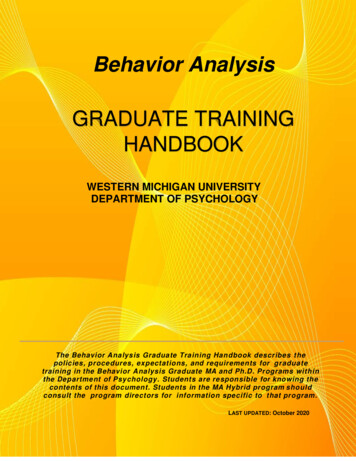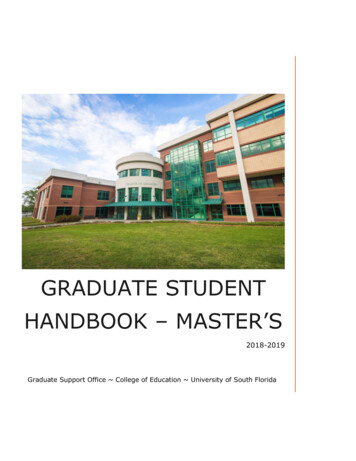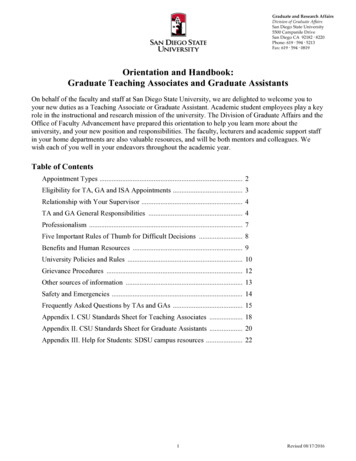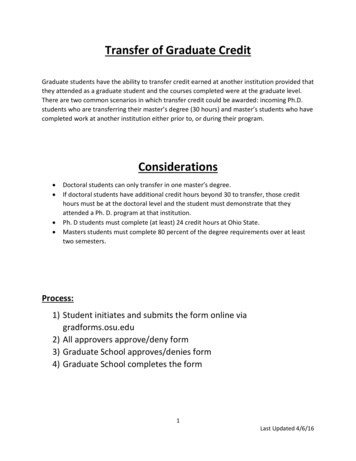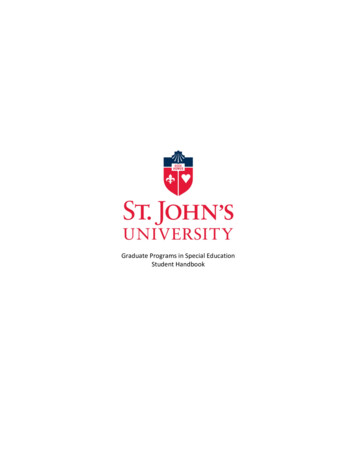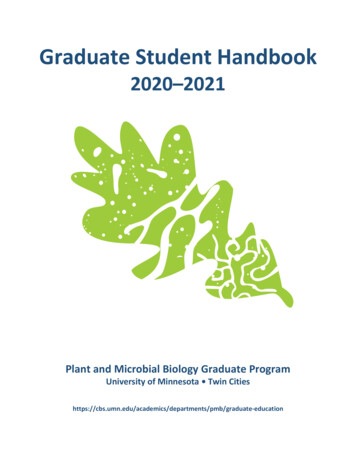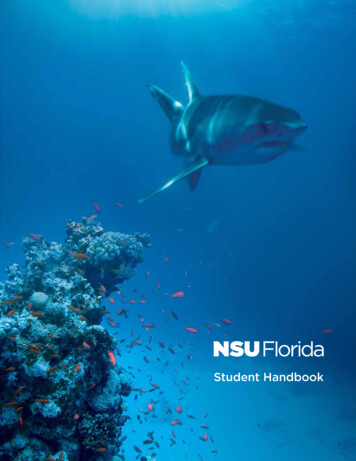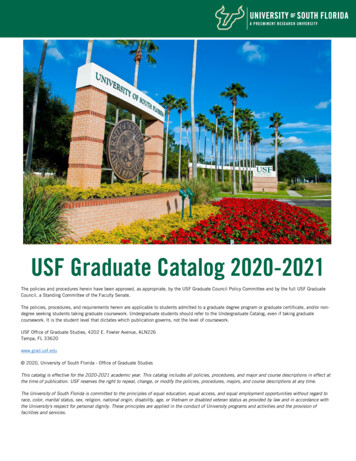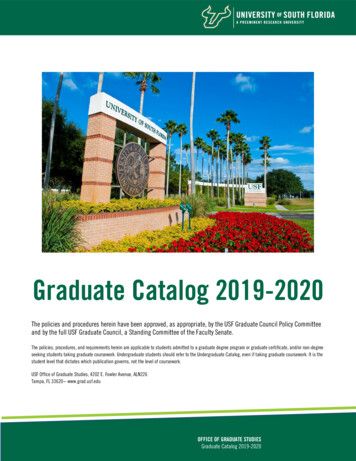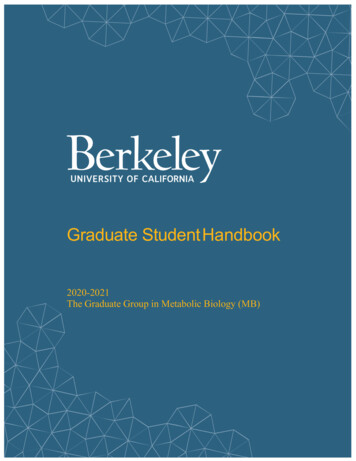
Transcription
Graduate Student Handbook2020-2021The Graduate Group in Metabolic Biology (MB)
Table of ContentsIntroductionPhD Course WorkMS Course WorkRequirement NotesElectivesResearchTeachingAdvisingOral Qualifying ExamDissertationFinancial Support and LeaveStudent Appeals ProcedureAdministration & Safety234567789101011131
IntroductionThese guidelines present the program of the interdepartmental Graduate Group in Metabolic Biology.The Berkeley General Catalog contains additional scholastic requirements of the Graduate Division. Theseguidelines stem from our philosophy that Graduate Study serves to inspire independence and originalityin the creation of new knowledge. Each graduate student achieves mastery of his/her field throughadvanced course work, independent study, and research.Program of StudyThe program includes course work in molecular and cell biology, nutritional biochemistry, and regulationof metabolism, with opportunities for electives in genetics, endocrinology, neurosciences, other biosciencesand chemistry. Major elements of the program include research training, teaching experience as a GraduateStudent Instructor (GSI), and opportunities for intellectual exchange and for presenting/defendingoriginal research results. Faculty mentors and advising committees guide individual students. Ph.D.students must pass an Oral Qualifying Examination to reach Ph.D. candidacy. The Ph.D. programculminates in acceptance of a dissertation. The M.S. program culminates in acceptance of a thesis.Course WorkIn addition to lab rotations, entering students take core course work in Molecular Biology, NutritionalBiochemistry, Cell Biology, and Advanced Metabolic Regulation. During the second year, students may electto enroll in courses related to their interests, in consultation with their Mentors. Students must enroll inNST 292 each semester and a total of three 290 Graduate Seminars for the duration of their program(following the first year), in addition to research units. Students receive credit for lab research throughNST 299.All graduate students must attend Departmental Seminars as an integral part of graduate training. Theinformal receptions held before seminars offer an excellent opportunity for students and faculty tointeract and exchange ideas. Students who cannot attend a seminar should email the Graduate AffairsOfficer with their reason. Valid reasons for absences include: illness, death of a relative, or attending animportant scientific meeting.Graduate students in MB must enroll in 12 units per semester, in 200 series or higher courses, or 15units of 100/200 series courses to qualify as full-time students. These courses must be taken for a lettergrade (not S/U), if the letter grade option exists. The unit requirement may be met by enrollment incourses, seminars, and/or research units (NST299). Students must maintain a grade point average of atleast 3.0 during their residency (a 3.1 GPA is required to receive funding). Students must maintain a Baverage in lecture courses (this excludes NST 211, NST 292, NST 293, and NST 299). The GAC (GraduateAffairs Committee) monitors student progress during the first year. Students who do not maintain a Baverage in the first semester will be placed on probation and may be asked to withdraw from the program.The GAC will decide, on a case-by-case basis, the disposition of students who fail to meet expectations.2
Ph.D. Course WorkFirst YearSemesterFallSpringCourse/ActivityMCB 110Molecular BiologyNST 103Nutrient Function and MetabolismNST 211AIntroduction to Research (rotations & reports)NST 292Graduate Research ColloquiumNST 293Faculty Research PresentationsNST 375Teaching in NSTCredits434112NST 260NST 211BNST 250NST 292NST 30244312Metabolic Bases of Human HealthIntroduction to Research (rotations & reports)Advanced Topics in Metabolic BiologyGraduate Research ColloquiumSupervised TeachingSecond YearSemesterCourse/ActivityFallXXX 290Graduate Seminar (Advanced Special Topics relevant toMetabolic Biology in any science department)NST 292Graduate Research ColloquiumSpringCredits11NST 299Dissertation Research3-8NST 302Supervised Teaching2ElectiveAdvanced Graduate Biosciences Course (optional)3-4XXX 292Graduate Research Colloquium1NST 299Dissertation Research3-12ElectiveAdvanced Graduate Biosciences or Chemistry Course(optional)Oral Qualifying Exam (taken in April or May)3-4Third Year - Completion of DegreeSemesterCourse/ActivityEveryNST 299Dissertation ResearchSemesterNST 292Graduate Research ColloquiumEverySemesterXXX 290Fall orGraduate Seminar (Advanced Special Topics relevant toSpringMetabolic Biology in any science department)Credits3-12113
MS Course WorkFirst YearSemesterFallSpringCourse/ActivityMCB 110Molecular BiologyNST 103Nutrient Function and MetabolismNST 211AIntroduction to Research (rotations & reports)NST 292Graduate Research ColloquiumNST 293Faculty Research PresentationsNST 375Teaching in NSTCredits434112NST 260NST 211B orNST 299NST 250NST 292NST 302Metabolic Bases of Human HealthResearch Units or Rotation Units44Advanced Topics in Metabolic BiologyGraduate Research ColloquiumSupervised Teaching312Second YearSemesterCourse/ActivityFallXXX 290Graduate Seminar (Advanced Special Topics in anydepartment)NST 292Graduate Research ColloquiumSpringCredits11NST 299Dissertation Research3-8NST 302Supervised Teaching2ElectiveAdvanced Graduate Biosciences Course (optional)3-4XXX 292Graduate Research Colloquium1NST 299Dissertation Research3-12ElectiveAdvanced Graduate Biosciences Course (optional)3-4After having presented at NST 292, a student has his/her finalmeeting with the Thesis Committee, during which he/shedefends his/her thesisTransferring to the Ph.D. TrackTransferring to the Ph.D. Track During the spring semester of the second year, the GAC may considera petition for a student to change tracks from Master’s to Ph.D. If the recommendation is approved bythe Graduate Affairs Committee, the student begins following the Ph.D. Program Outline starting withan Oral Qualifying Examination. Criteria for consideration include a GPA of 3.1 or better, a B averageMCB110, NST103, 260 and 250, and a letter from a Metabolic Biology Graduate program facultymember committed to sponsoring the student, including financial support.4
Requirement Notes(Please check the online course catalog for the most up-to-date course listings: http://classes.berkeley.edu)Introduction to Research (NST 211A,B): Laboratory rotations help students to assimilate into thedepartment, expose students to a variety of techniques and topics, assist students in choosing mentors,and provide information to potential mentors. Exposing students to a variety of techniques and topics isan important rationale for rotations and an important aspect of the training program. Accordingly, theHead Graduate Advisor may interview new students before assigning the first rotation to ensure that allthree required rotations are not taken in closely related areas or in labs that have no major differences intechnology.Rotation Requirements for Ph.D. Students:Of the three rotations required, the first may be assigned by the Head Graduate Advisor with a viewtoward diversifying the research experience of students. The second and third rotations are selectedby the student. All rotations require the consent of the Principal Investigator. A student may elect totake an optional fourth rotation at the end of the first academic year to assist in choosing a mentorand/or to gain exposure to a specialized technique. A 15-minute presentation and five to seven pagewritten report is required after each rotation, as a condition of enrollment in 211A and B. The first twopresentations are given to the Head Graduate Advisor or a preceptor designated by the NST chair andother first-year students at the end of each rotation. The third presentation may be delivered to allprogram students and faculty during the last two Graduate Research Colloquia of the academic year,if requested by the student. New students and the Head Graduate Advisor meet at least two additionaltimes per semester, as part of NST 211, to discuss progress/problems, requirements, and the processfor selecting rotation and dissertation mentors.Rotation Requirements for M.S. Students:Master’s students will be required to complete one rotation before joining a lab for thesis research.Students have the option of a second rotation. A 15-minute presentation and written report is requiredafter each rotation, as described above for PhD students. Once a student has identified and beenaccepted into a lab, a Thesis Committee will monitor research progress and make recommendationsfor experimental design of the research project.Graduate Seminar (XXX 290): Students may take any Graduate Seminar (Advanced Special Topics)relevant to MB presented in any of the biological/chemical sciences programs at UC Berkeley, such asIntegrative Biology, Comparative Biochemistry, Molecular and Cell Biology, Endocrinology, Chemistry,etc. Each member of the Berkeley Graduate Faculty is responsible for developing a Graduate Seminarperiodically. Thus, program students have the opportunity to take a special topics course from manymembers of the sciences faculty on campus during their training. Graduate Seminars are small (nomore than 15 students), literature-oriented, special-topics discussions that meet once a week for oneto two hours, moderated by a single faculty member. PhD students are required to take three GraduateSeminars. Typically students will take one per year, following the first year. MS students are requiredto take one Graduate Seminar.Graduate Research Colloquium (NST 292): Graduate students present dissertation research results andplans for future experiments. Attendance is mandatory for all graduate students. Any anticipatedabsence should be communicated to the Graduate Affairs Officer in writing (email is fine). Valid excuses forabsences include: illness, death of a relative, or attending an important scientific meeting. More5
than two unexcused absences will result in a failure, which will affect the GPA and therefore funding,and will need to be made up by taking an extra 292. Students are encouraged to participate in thediscussions and must hand in an evaluation form. One presentation per year is required of all students.The presentation should serve as the prelude to dissertation committee meetings, which should be heldas closely after the 292 as is practical. First-year students may opt to present a short-report of onerotation.Faculty Research Presentations (NST 293): These are intended to educate first-year graduate studentson topics and techniques of faculty research to broaden their education, and as an aid in choosingrotations/ mentors.Preparation for/Supervised Teaching (NST 375/302): The NST 375 component includes 1 hourlecture/ discussion per week for 1 credit. Creative approaches to teaching metabolism topics to diverseaudiences are emphasized. Participants identify needs of target populations, formulate educationalobjectives, design and/ or use motivational teaching strategies, and evaluate the impact of their teachingon knowledge, attitudes and behavior. The NST 302 component includes practical supervisedexperience in teaching metabolism at the University level for 1 to 4 credits. Typically, students are assignedto serve as GSIs for courses that include: Introduction to Human Nutrition (NST 10, an overview ofdigestion and metabolism of nutrients aimed at non-majors in all years), Nutrient Function andMetabolism (NST 103, a junior year comprehensive course in nutritional biochemistry for majors in MB),Food Toxicology (NST 110, a comprehensive survey of the principles of modern toxicology, includingmechanisms of metabolic activation, detoxification, and selective toxicity, required for toxicology majors),Human Nutrition (NST 160, focuses on the biochemical and physiological bases for adjustments in humannutrient use during common nutritional problems and diseases), Experimental Nutrition Laboratory (NST170, basic principles and techniques used in biochemical, analytical and molecular nutrition experiments),Human Food Practices (NST 104, historical, geo-ecological, biological, cultural, socio- economic, politicaland personnel determinants of human diets).ElectivesProgram students may take any elective relevant to their research and/or interests given by any of thechemistry or biology programs at UC Berkeley, such as Integrative Biology, Comparative Biochemistry,Molecular and Cell Biology, Endocrinology, and Chemistry. Below are examples of electives selected mostfrequently. This list does not represent all electives available. Please see the Online Schedule of Classes(available at schedule.berkeley.edu) for course descriptions.A note about MCB courses:Only MCB students can take MCB 200 A and B (Fundamentals of Molecular and Cell Biology). MB studentsmay register for any other MCB course. MCB students are given priority registration for MCB courses.A student on the wait list for a course may ask a professor for permission to enter the class. Professorshave a certain number of codes they may give to students who are on the waiting list or to studentswho are not registered for the course. There are a greater number of MCB elective options in the springsemester.Physiology and Cell Biology Laboratory (MCELLBI 133L)Molecular Immunology (MCELLBI B150)Macromolecular Reactions and the Cell (MCELLBI 210)Advanced Developmental and Stem Cell Biology (MCELLBI 231)6
Advanced Genetic Analysis (MCELLBI 240)Comparative Physiology and Endocrinology Seminar (INTEGBI 248)Biostatistical Methods (PBHLTH 240A)Longitudinal Data Analysis (PBHLTH 242C)Epidemiologic Methods I (PBHLTH 250A)Molecular and Genetic Epidemiology and Human Health in the 21st Century (PH256)Toxicology I (PBHLTH 270B)Chemical Biology I – Structure, Synthesis and Function of Biomolecules (CHEM 271A)Chemical Biology II - Enzyme Reaction Mechanisms (CHEM 271B)Chemical Biology III – Contemporary Topics in Chemical Biology (CHEM 271C)ResearchResearch provides the major focus of graduate education. Many first-year activities are directed towardintroducing new students to various research opportunities to enable them to identify their researchinterests and Mentor. Research rotations are particularly important in this regard. Ph.D. studentscomplete at least three laboratory rotations during their first year. M.S. students complete up to twolaboratory rotations during their first year. Following each rotation, students submit a written report andmake a short oral presentation in NST 211 A/B. Other activities that aid students in choosing a Mentorinclude presentations by faculty in NST 293, research reports in NST 292, departmental seminars, anddiscussions with the faculty.The Mentor oversees the student’s research program and overall education, assisted by the GuidanceCommittee. Ph.D. students select their Mentor at the end of the first spring semester. MS studentsselect their Mentor at the conclusion of their first or second rotation. The Mentor chairs the Dissertationor Thesis Committee.TeachingAll graduate students in the Ph.D. program are required to obtain teaching experience as a GraduateStudent Instructor (GSI). This assignment may involve lecturing, leading discussions, lab preparation,examination writing, and grading. Each Ph.D. student must serve as a GSI for at least one semester. Theteaching experience is accompanied by enrollment in NST 375/302, Professional Preparation: Teachingin Nutritional Sciences & Toxicology. The Graduate Advisors attempt to match students with appropriatecourses considering the wishes and qualifications of the student and the teaching needs of theDepartment. To be appointed as a GSI, a student must meet the GSI requirements and fulfill the GSIresponsibilities outlined by the Graduate Council (available for review on gsi.berkeley.edu).Students in the M.S. program are not required to serve as GSIs, but may elect to do so, depending onthe availability of positions. Priority for NST GSI appointments will be given to eligible NST Ph.D.students first, then to eligible NST M.S. students, and finally to other eligible UC Berkeley graduatestudents.7
AdvisingGraduate AdvisorsThe Graduate Group in MB has four Graduate Advisors, one of whom serves as the Head GraduateAdvisor. The Graduate Advisors form the Graduate Affairs Committee (“GAC”), which governs the GraduateGroup and represents the Dean of the Graduate Division in approving programs of study for graduatestudents. Most forms and petitions submitted to the Graduate Division, including applications foradvancement to candidacy, qualifying examinations, and petitions, must be completed in CalCentralunder the “eForms WorkCenter” section of the “Advising Resources” card on the dashboard. The HeadGraduate Advisor will advise each new graduate student until a Mentor is selected. First-year studentsmay not drop courses, or elect to receive a grade other than the usual letter grade without writtenpermission of the Head Graduate Advisor.Guidance CommitteesPlease see grad.berkeley.edu for the most up-to-date committee policy information. All committeesmust follow the committee composition guidelines outlined by Graduate Division (available ongrad.berkeley.edu/ policy).Dissertation Committee and Thesis CommitteeDissertation Committees (Ph.D. program) and Thesis Committees (M.S. program) provide intellectual as wellas technical assistance to students throughout the research program. The Dissertation Committee(Ph.D. program) forms after the student has passed the Oral Qualifying Examination for the Ph.D.degree. The Dissertation Committee consists of at least three faculty members, with one from outsideof the MB graduate program. The Mentor serves as Chair of the Committee. The Thesis Committee(M.S. program) forms after the student has selected a Mentor by joining his/her lab. The Mentor servesas the committee chair. The Thesis Committee consists of three members.The student suggests to the Head Graduate Advisor the names of faculty members who are willing toserve on Dissertation/Thesis committees, after consultation with their Mentors. The Head GraduateAdvisor recommends appointments to the Graduate Dean. The student must complete an applicationfor Advancement to Candidacy in CalCentral. The eform will be reviewed by the graduate student affairsofficer before getting submitted to the Graduate Division. When the Graduate Division approves thisform, it will send a formal notice of Advancement to Candidacy to the student. Requests for changes ofthe committee should be made through the Head Graduate Advisor to the Graduate Division; suchchanges are unusual and require strong justification.The Dissertation Committee should meet as soon as possible after a student passes the Oral QualifyingExam and certainly no later than three months following the Oral Qualifying Examination, at which timethe student will present a detailed description of the proposed research; it then should meet at leastonce a year, as soon after the 292 as is practical. Similarly, the Thesis Committee should meet withinthree months of the student joining a lab (excluding rotations). Ideally, committee meetings should occurthe same day or soon after the NST 292 presentation. The student must keep the committee membersinformed of the progress of the research so that he/she may ask for and receive advice from thecommittee.8
Oral Qualifying ExaminationThe Oral Qualifying Exam (OQE) will be taken during the fourth semester. The Committee will confirmthat the student has successfully completed the required core courses, the teaching requirement (or is in theprocess of completing the requirement), and has initiated a robust research program. Failure of thestudent to proceed to the OQE before the fall semester of year three will be grounds for dismissal orredirection to an M.S. The OQE may, with compelling justification and for extraordinary events, bepostponed until a later date upon recommendation and approval of the Head Graduate Advisor or GAC.The OQE Committee consists of four faculty members approved by the Head Graduate Advisor andthe GAC. Students are invited to propose membership of their OQE committees to the Head GraduateAdvisor for approval. Students must submit their proposed qualifying exam committee by February 1st.The Head Graduate Advisor and/or MB Graduate Affairs Committee may elect to approve the proposedcommittee or may elect to change some or all of the committee members. Three committee members,including the chairperson, must be Berkeley Academic Senate Faculty who are members of the MB program.One committee member must be a member of the Berkeley Academic Senate Faculty not affiliated withthe MB program. One committee member may include a MB program member with a primaryappointment outside of the Berkeley Academic Senate Faculty. Graduate Division has final approval ofOQE committee membership. Students are advised strongly to consult with their Mentors on choosingOQE committee members and to select faculty who can contribute to the development of theirproposals. Faculty guidance during proposal preparation is key to a successful OQE.Examination FormatThe OQE committee will examine the student on: General scientific knowledgeBackground knowledge in the area of his/her dissertation researchAbility to formulate and defend a hypothesisAbility to defend experiments and techniques to test hypothesesAbility to postulate expected and alternative resultsInterpretation of expected and alternative resultsThe student will prepare a formal written proposal to describe his/her dissertation research inconsultation with his/her OQE Committee. The OQE Committee will decide when the student is readyfor the oral defense of the written proposal. The student must distribute a copy of the proposal to eachmember of the Committee at least one week before the exam. Students are encouraged to start earlyin their second spring semester choosing a committee and preparing their proposal. The HeadGraduate Advisor will select a committee and set the test date for any student who has not met thesetwo milestones by February 1 of their second spring semester.Areas for ExaminationThe expectation of breadth will include all the course work taken during the student’s first and secondyears in the graduate program (including any prerequisite material).The OQE Committee may recommend: 1) a pass; 2) a partial failure requiring additional course workand/or written reports and/or revision of research plans; 3) total failure. Total failure may result in re9
direction to an M.S or separation from the program. Graduate Division policy establishes thesecategories, i.e. there is no such category as a qualified pass. A partial failure will require a new Oral defense.Upon successful completion of the OQE, the student enters into candidacy and responsibility for his/herfurther development passes to the Mentor and the Dissertation Committee.DissertationUniversity guidelines state that the Doctor of Philosophy degree “is awarded in recognition of a student’sknowledge of a broad field of learning and for distinguished accomplishment in that field through originalcontribution of significant knowledge and ideas.” The student must demonstrate critical ability andpowers of imagination and synthesis. To complete the dissertation satisfactorily, students must take thefollowing steps:1.2.Develop a hypothesis; the topic may encompass a question of basic science in metabolicbiology in the human or in experimental modelsDesign experiments to test the hypothesis3.Develop and/or apply appropriate techniques to generate data4.Interpret the data; discuss the data in context of the literature, and evaluate the significanceof the findingsPublish the results (communication in peer-reviewed journals represents a major activity ofresearch scientists)5.The dissertation must be read and approved by all members of the student’s Dissertation Committee.Students should reference the Graduate Division website for the current guidelines for format and style. Thedissertation is submitted in final form to the Graduate Division for approval. One bound copy of thedissertation must be submitted to the Department and one to the Mentor. Generally, copies (notnecessarily bound in hard cover) are given to the other members of the Dissertation Committee.All Ph.D. students are encouraged to present a formal seminar upon final approval of their dissertations.Students may present during the Nutritional Science and Toxicology department’s Wednesday seminar, asa special seminar, or during the time normally set aside for NST 292.Departmental Financial Support andLeavePh.D. students who remain in good academic standing and elect to study with a Mentor in the GraduateGroup in MB may receive an award package of financial assistance. Up until the end of the third orfourth rotation, whichever occurs first, PhD students are funded (resources permitting) by NST. Supportwill be announced during the annual prospective student visit day. When a student joins a lab financialsupport becomes the responsibility of the research Mentor, who may use a combination of GraduateStudent Researcher (GSR) and/ or Graduate Student Instructor (GSI) appointments, grants andfellowships. If a student declines a teaching position for any reason, he or she may no longer receivedepartmental financial support. If the student’s GPA falls below 3.1, he or she may not be eligible forsupport. Ph.D. students who do not select a mentor by the end of the fourth rotation are responsible fortheir own financial support.10
Students who receive financial support are expected to devote their full-time efforts to their graduatework. Arrangements for vacation or other leaves must be discussed with Head Graduate Advisor(during rotations times) or the Mentor (after a student joins a lab). Graduate students are eligible for nomore than four weeks of leave per year, including school breaks. Financial support may be suspended forstudents who are absent longer.MS students generally do not receive financial support from the department. An MS student maychoose to offset the cost of tuition/fees and earn a stipend with GSI appointments, depending on theavailability of positions. A Mentor may choose to support a M.S., but is not obligated to do so. Thesearrangements should be part of the conversation with prospective Mentors.Student Appeals ProcedureThe following procedures have been established in accordance with the Graduate Division for studentswho encounter difficulties while enrolled in our graduate program:Purpose and ScopeThe purpose of this procedure is to afford students in the Graduate Group in MB an opportunity ofresolving complaints about dismissal from graduate standing, placement on probationary status, denial ofreadmission, and other administrative or academic decisions that terminate or otherwise impede progresstoward academicor professional goals.The scope of this procedure is limited to the matters listed above, and excludes complaints regardingdenial of admission, student records, grades in courses of instruction, student employment, studentdiscipline, and auxiliary student services (such as housing, child care, etc.). This procedure may not beused for complaints regarding actions based solely on faculty evaluation of the academic quality of astudent’s performance, or decanal evaluation of a student’s appropriate academic progress, unless thecomplaint alleges that the actions may have been influenced by non-academic criteria.Informal Resolution ProceduresA student may pursue informal resolution of a complaint by scheduling a meeting with his/her MajorProfessor to discuss the complaint and explore possible avenues of resolution. If no solution is found,the student should then schedule a meeting of his/her Dissertation Committee. If informal resolution ispursued, it must be initiated, and should be completed, within 30 days. At any point in this process, if asatisfactory solution cannot be reached, the student may initiate formal resolution by putting thecomplaint in writing.Formal Resolution ProceduresA written complaint must include information regarding the action being complained of and the date itoccurred, the grounds upon which the appeal is based, and the relief requested. The complaint must bebased on one or more of the following grounds:1.2.Procedural error or violation of official policy by academic or administrative personnelJudgments improperly based upon non-academic criteria including, but not limited to,11
3.discrimination or harassment on the basis of sex, race, national origin, color, age, religion, sexualorientation, or disabilitySpecific mitigating circumstances beyond the student’s control not properly taken into accountin a decision affecting the student’s academic progressThe written complaint must be received by the Head Graduate Advisor within thirty days from the timethe student knew, or could reasonably be expected to have known, of the action that is the subject ofthe complaint. The complaint will be presented to the Graduate Affairs Committee (GAC), which shouldcomplete its investigation and notify the student of the outcome of the complaint within sixty days of thedate it was received.The time frame for filing a written complaint may be extended by the Group if the student has beeninvolved in continuing efforts toward informal resolution, and the informal resolution process wasinitiated within thirty days of the time the student knew, or could reasonably be expected to have known,of the action that is the subject of the complaint. All time frames referred to in this procedure refer tocalendar days. Summer and inter-semester recesses are not included within these time frames.Upon receipt of a written complaint, the Head Graduate Advisor will assign a member of the GAC toi
NST 293 Faculty Research Presentations 1 NST 375 Teaching in NST 2 Spring NST 260 Metabolic Bases of Human Health 4 NST 211B or NST 299 Research Units or Rotation Units 4 NST 250 Advanced Topics in Metabolic Biology 3 NST 292 Graduate Research Colloquium 1 NST 302 Supervised Teachin
